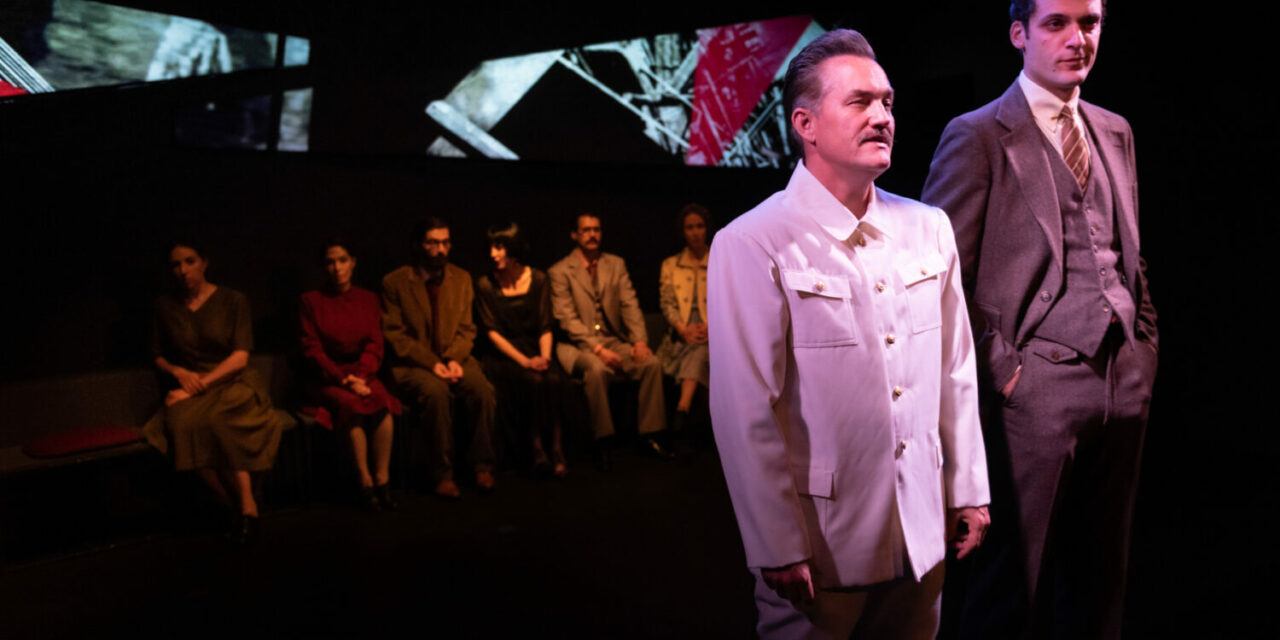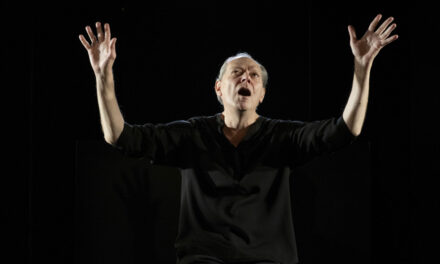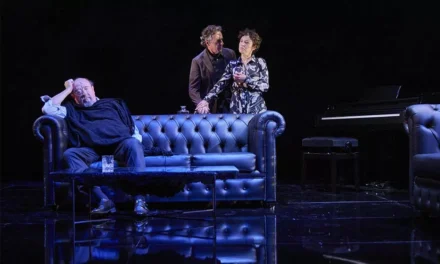In Murray Mednick’s “Mayakovsky and Stalin”, which made its New York premiere at the Cherry Lane Theatre on October 20th, the life of an avant-garde socialist poet intertwines with the ruthless dictator. Although the two towering figures of the Russian revolution never met with each other in this play, what links the two together is a muffled gunshot. In 1932, during the height of the Soviet famine, which largely caused by Stalin’s collectivization policy, his second wife Nadezhda Alliluyeva shot herself in the heart at the Kremlin. Two years earlier, Mayakovsky took his own life with the same method.
Mednick, also the director of the play, chooses a minimalist staging. There is no set-piece on stage, other than a roll of cubicle chairs upstage for the actors to sit on. The only indications of time and place are the customs (designed by Shon Leblanc) and projections (Hana S. Kim who also designed the light). Through the command of the chorus (Max Faugno, who is always on stage and always nervous), Mednick presents various scenes from Stalin and Mayakovsky’s life in a non-liner fashion, starting and ending with the two suicides. The unifying principles of these scenes are murky in the first act, largely because Mednick wants to establish the works and lifestyle of Mayakovsky to the audiences. As a pioneer member of the Russian Futurism movement, whose principle is “espoused the rejection of the past, and a celebration of speed, machinery, violence, youth, and industry”, Mayakovsky also led a Bohemian life and Daniel Dorr plays him with robust youthful energy. He falls in love with Russian actress Lilya Brik (Laura Liguori, wide-eyed but not enough charm) and her husband Osip Brik (Andy Hirsch, a very grounded performance compared to Lilya) not only has no objection but also become a patron of sorts for Mayakovsky. But Mayakovsky is a contradiction to himself, attractive and deadly to any woman, self-loathing and self-obsessed to the highest order, fundamental believer of the Marxist ideology but not of the act of revolution. Dorr’s misdirect energy only shines when he recites a poem of Mayakovsky but didn’t bring out the complexity of the poet.
On the other hand, there is no need to establish who Stalin is, a figure that has existed in the public consciousness for decades. Maury Sterling plays the notorious dictator in a silk white army suit. You can sense the determination in his eyes, in a scene which Stalin campfires with his entourages, and he doesn’t want one of his Jewish subordinates to “catch his gaze.” You don’t know what you will see in his eyes, but death is not a far-off guess. Jennifer Cannon’s Nadya is heavily oppressed from the start to end. It was not until the very end of the second act, in a scene on a train which Stalin and Nadya was just married, we get a glance of her happiness and why she married such a man. Such scene came too late and too short, though it did add a layer of emotions to the otherwise monotoned Nadya. Just like in real life, Nadya is still a woman who lives in the shadow of Stalin.
Mednick plunges into the spiritual world of the two men in the second act. Both Stalin and Mayakovsky are believer of Marx rather than Christ, but God is still a strong presence in this play. Michelle Azar plays Masha, a personal servant of Nadya who also spies on her and is a devoted Eastern Orthodox who sticks to her beliefs during the revolution with a stiff sternness. We don’t know what Masha wants as a character, but we know, unlike the others, she is never confused. On contrast Mayakovosky is always confused; he is highly aware of the casualty of a revolution and the necessity of it. Torn in the middle and without an inner spiritual guidance, Mayakovosky cannot act on his political beliefs. Stalin can smell the blood in the air too, and unlike Mayakovosky, he feasts upon it. He sees a vacancy on the top, and the revolution and Communist party can make him the new God. Thus, he acts ruthlessly on the road of ascending to the top without caring for anybody in his life. The comparison Mednick draws between the two men is suitable for this small-scale production. But, the small-scale in writing never gives the audiences enough backdrop to make their own judgment about the necessity of gruesome revolution, making his characters only exist in a historical vacuum.
This post was written by the author in their personal capacity.The opinions expressed in this article are the author’s own and do not reflect the view of The Theatre Times, their staff or collaborators.
This post was written by Zhe Pan.
The views expressed here belong to the author and do not necessarily reflect our views and opinions.


















